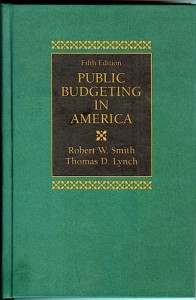Public Budgeting in America Fifth Edition
Public Budgeting in America Fifth Edition
By Robert W. Smith, Thomas D. Lynch
Pearson Prentice Hall
ISBN-10: 0-13-097993-7
ISBN-13: 978-0-13-097993-3
Published by Longman
Copyright © 2004
Pub. Date: Dec 15, 2003
Format: Paper
Pearson Prentice Hall. all rights reserved. Printed in the United States of America. This Publication is protected by Copyright and permission should be obtained from the publisher prior to any prohibited reproduction, storage in a retrieval system, or transmission in any form or by any means, electronic, mechanical, photocopying, recording, or likewise.
PREFACE
This fifth edition makes improvements to previous editions by drawing upon the strength of a collaborative effort. Specifically, this edition adds a co-author—Robert Smith, who comes to this task with considerable state government budget experience. We believe this edition continues and enhances the blend of practical application, theory, and empirical rigor necessary for understanding public budgeting in the United States. Our collaboration in this edition focuses on balancing the strength of a winning approach with timely additions and updated tables, charts, and graphs. This revised material complements the successful approach of the earlier editions, which explained budgetary practice and process as they developed in the twentieth century. It was our task in this fifth edition to develop an explanation of public budgeting in a twenty-first century context.
Indeed, public budgeting is an evolving endeavor, and the past twenty years have witnessed legislation and practices that have tried to cope with budget crises at the federal, state, and local levels. Unfortunately, many of these efforts have not adequately addressed the complex structural, governance, and process issues fundamental to public budgeting. Our approach was to address recent budget developments and related phenomena with a focus on the problem itself. We are optimistic that the level of academic inquiry and professional expertise in the field of public budgeting is up to the task. However, the real challenge is to bring these energies to bear on the fundamentals of the budgetary process for meaningful long-term reform.
To this end, this text blends the experiences of a former state budget practitioner and the insights of an accomplished budget scholar. Of particular note is the chapter on the use of analysis in the budget process. The result is a text that is reorganized, relevant, and timely for students and teachers of public budgeting. At the same time, it is difficult to separate budgeting from issues of financial management, and so we address both subjects in a manner that stresses the interrelationships between the two. Finally, because there are few texts that focus on the details of budget practice and process, we believe that this book is an essential read for students and practitioners interested in a full understanding of budgeting in America.
We acknowledge our appreciation to everyone who has contributed to this revised edition. We wish to especially thank the Prentice Hall editorial staff including Heather Shelstad, John Ragozzine, and Suzanne Remore. Also, a special thanks goes to Jessica Drew, Jennifer Bryant, and the anonymous reviewers from Prentice Hall who worked on this project. The authors would also like to thank Melissa Scott of Carlisle Publishers Services for her patience, fine editing, and other suggestions to improve this fifth edition. We also gratefully acknowledge the technical and support services provided by Rob Carey, a Ph.D. student and researcher in the Policy Studies program, and Stacey Davenport and Courtenay Ryals of the Department of Political Science at Clemson University.
Finally, this text would not be possible without the unwavering support and commitment of our wives and families. A loving thanks goes to Kathleen C. Gallagher-Smith and Keegan and Nolan Smith. Another loving thanks goes to Cynthia E. Lynch for her tolerance and patience as this edition was prepared.
Robert W. Smith, Ph.D.
Thomas D. Lynch, Ph.D
